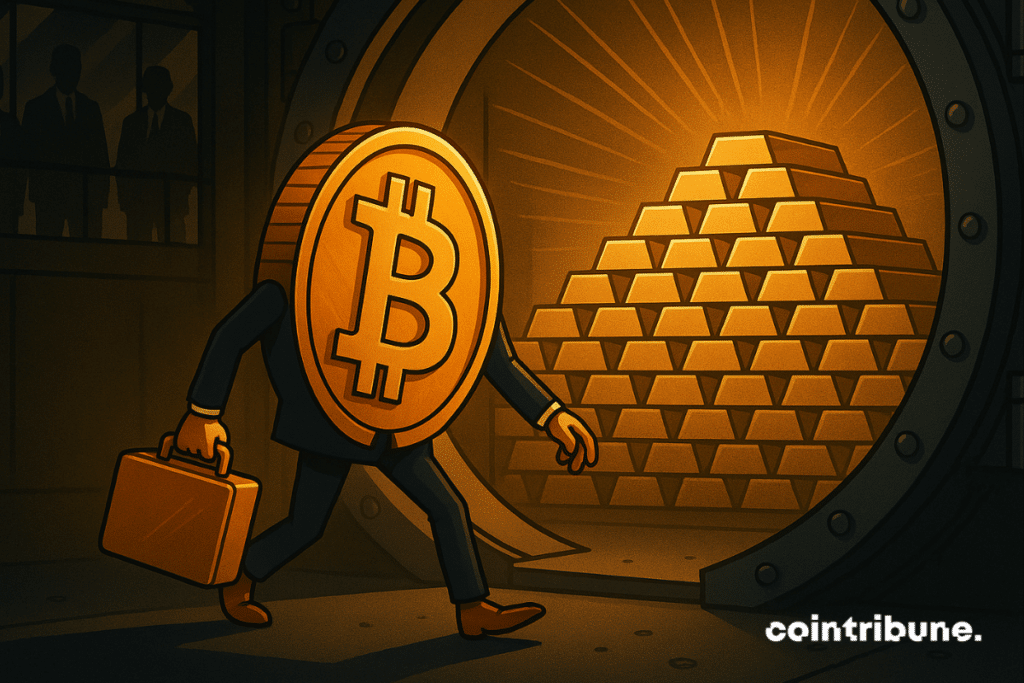Bitcoin Poised to Join Gold on Central Bank Balance Sheets as Volatility Stabilizes: Deutsche Bank Analysis
Central banks worldwide are preparing to add Bitcoin to their reserves alongside gold as market fluctuations settle—Deutsche Bank confirms the seismic shift in global monetary strategy.
The Institutional Pivot
Traditional finance giants finally acknowledge what crypto natives knew for years: digital gold isn't just coming—it's already knocking on treasury doors. Volatility metrics show Bitcoin maturing faster than skeptics predicted.
Balance Sheet Revolution
Reserve managers now face their 'internet moment'—either adapt to digital asset allocation or risk holding outdated portfolios. The analysis suggests diversification into crypto assets will become standard practice within this cycle.
Wall Street's Reluctant Embrace
Deutsche Bank's endorsement signals broader institutional acceptance, though traditional bankers still approach crypto like grandparents discovering smartphones—cautiously, with equal parts fascination and terror.
Gold 2.0 or Something New?
While comparisons to gold provide comfort for conservative investors, Bitcoin's programmability and borderless nature offer capabilities bullion never could—which might explain why central bankers are studying blockchain between their daily espresso breaks.
 Read us on Google News
Read us on Google News
In Brief
- Deutsche Bank projects that central banks could begin adding Bitcoin to their reserves within the next five years.
- The bank believes Bitcoin’s volatility will decline as regulatory clarity deepens and market liquidity improves.
- Recent market trends show Bitcoin reaching record highs while its volatility hit historic lows suggesting early signs of maturity.
Stable Markets Could Bring Bitcoin Into Reserves
According to the bank’s research, Gold will continue to hold its position as the dominant official reserve. Bitcoin, however, is expected to expand through private and alternative reserves before making its way into central bank balance sheets, a process that could become more visible by 2030. The pace of this shift will depend on how the market matures under clearer regulation and more stable conditions.
Volatility has been a major concern for BTC. Its price has historically swung sharply, making it less suitable as a reliable reserve. Deutsche Bank, however, believes these fluctuations should ease as regulation becomes clearer. The bank explained, “With regulatory efforts accelerating – from the US to MICA in the EU and the FCA’s crypto roadmap in the UK – we expect Bitcoin’s volatility to decline as more transactions are conducted, ensuring deeper liquidity in the markets.”
Bitcoin Shows Signs of Maturity
The report refers to last month, August, as evidence of this shift. During that period, Bitcoin’s price reached a record high above $123,500, while its 30-day volatility fell to a historic low of 23%. This was unusual, as in previous years, sharp price gains were typically accompanied by extreme swings, driven largely by speculation.
Deutsche Bank interprets this development as the beginning of a separation between price growth and volatility. In practical terms, it means the asset may now be capable of rising in value without the disruptive swings of the past. If that trend continues, bitcoin could follow a steadier growth path that makes it more attractive to both investors and central banks.
This combination suggests we may be witnessing the start of a gradual decoupling between Bitcoin’s spot prices and volatility as the crypto’s integration into portfolios is maturing. It could signal a more sustainable trend beyond previous instances of short-term market speculation.
Deutsche BankBitcoin in U.S. Reserve Plans
Following signs of market stability, the discussion around Bitcoin’s role in official reserves is not limited to research papers:
- The Trump administration in the United States has explored the idea of creating a strategic Bitcoin reserve.
- Building on this, Senator Cynthia Lummis introduced the BITCOIN Act, proposing that the government purchase 200,000 Bitcoins each year for five years, totalling one million coins.
- These developments show that Bitcoin’s potential as a reserve asset is moving from theoretical analysis into active policy consideration.
Dollar’s Central Role Remains
Despite its positive outlook on Bitcoin, Deutsche Bank emphasised that neither Bitcoin nor gold is likely to take the place of the U.S. dollar. The dollar is expected to remain the primary reserve asset and the main medium of exchange worldwide. The bank underlined that governments are expected to regulate digital assets in ways that prevent them from weakening national currencies.
Deutsche Bank has previously described Bitcoin as a modern version of gold, even calling it the “21st century gold.” Its latest analysis builds on this idea, positioning BTC as a digital asset that can stand beside gold in the reserve system while the dollar continues as the foundation of global finance.
Maximize your Cointribune experience with our "Read to Earn" program! For every article you read, earn points and access exclusive rewards. Sign up now and start earning benefits.

